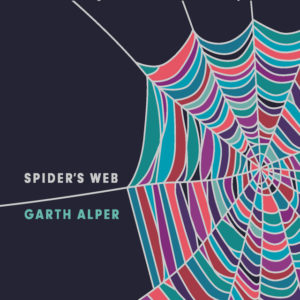Pianist and composer Garth Alper focuses on all-original material here, with some superb help from his friends, on Spider’s Web, his fifth recording as a leader. The blues and bluesy feelings course through the project, which is a strong follow up to his 2017 release, Stratus.
The band includes tenor saxophonist Lucas Munce, guitarist Jeff George, bassist Bob Nash and drummer Chris Munson. All are fellow faculty members at the University of Louisiana at Lafayette, where Alper is Jazz Studies coordinator.
This rock-solid ensemble displays terrific chemistry throughout their exploration of seven Alper compositions. Tenorist Munce is front and center on most tracks, where he has free rein in interpreting the leader/composer’s material. In most cases, Alper joins in with supplemental solos. Guitarist George weighs in on four of the seven tunes.
A teasing stop-time rhythm on the opener, “Stop-Time Stomp,” cushions Munce’s robust tenor sax solo. Alper adds a glistening solo response. “The Glide” showcases George’s bluesy guitar artistry and Munce’s frantic-at-times tenor sax answer. Clever variations on its two-bar melodic hook set the tone before Alper and Nash join the teasing solo relay.
Searing guitar dominates the title track, “Spider’s Web.” Drummer Munson’s deep, dark 12/7 rhythm sets the tone on this 12-bar minor blues, which combines bits of propulsive mystery and suspense. “The News Blues” is an up-tempo 24-bar blues that Alper says was inspired by the painful challenge of trying to stay informed in the swirling midst of national and world current events. Nash’s bass solo keeps it grounded.
“Mournful,” the session’s lone ballad, is dark and wistful, yet gradually shifts to a gentler optimistic feel. The tight interplay between Alper’s piano and Munce’s tenor artistry sets up their respective solos. The guitar-less quartet is locked in “Bop-Wanna-Be,” a swinging bebop adventure in which all the players aggressively dive into Alper’s melodic twists and turns. Munce sets its up-tempo pace before turning the solo spotlight over to the composer.
The closer, “Triplet Tale” has some ballad qualities but is a bit more complex with a plodding rhythm—it could be 4/4, or 6/8 or 12/8 depending on how one measures it—and some mysterious twists. Alper’s laid-back and pensive solo is right at the heart of it, until Munce responds in kind. This complex beauty underscores the leader’s breadth and depth as a player and a composer of challenging, diverse material.




